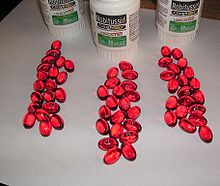
Dextromethorphan, or DXM, a common active ingredient found in many over-the-counter cough suppressant cold medicines, is used as a recreational drug and entheogen for its dissociative effects.[1] Street names include Brownies, Dextro, Drix, Gel, Groove, Lean, Mega-perls, Poor man's ecstasy, Red devils, Robo, Rojo, Rome, Skittles, Sizzurp, Sky and Velvet.[2]
It has almost no psychoactive effects at medically recommended doses. However, dextromethorphan has powerful dissociative properties when administered in doses well above those considered therapeutic for cough suppression.[1] Recreational use of DXM is sometimes referred to in slang form as "robo-tripping", whose prefix derives from the Robitussin brand name, or "Triple Cs", which derives from the Coricidin brand whose tablets are printed with "CC+C" for "Coricidin Cough and Cold". However, this brand presents additional danger when used at recreational doses due to the presence of chlorpheniramine.
In over-the-counter formulations, DXM is often combined with acetaminophen (paracetamol, APAP) to relieve pain;[3] however, to achieve DXM's dissociative effects, the maximum daily therapeutic dose of 4000 mg of APAP is often exceeded, potentially causing acute or chronic liver failure, making abuse and subsequent tolerance of products which contain both DXM and APAP potentially fatal.[4]
An online essay first published in 1995 entitled "The DXM FAQ" described dextromethorphan's potential for recreational use, and classified its effects into so-called plateaus.[5] Each plateau is categorized depending on how much MG of DXM is ingested, each featuring varying or more intense effects. The defined number of plateaus vary depending on source, but the generally agreed-upon number is 4 or 5.[6]
Owing to its recreational use,[7] many retailers in the US have moved dextromethorphan-containing products behind the counter so that one must ask a pharmacist to receive them or be 18 years (19 in New York and Alabama, 21 in Mississippi) or older to purchase them.[8] Some retailers also give out printed recommendations about the potential for abuse with the purchase of products containing dextromethorphan.
- ^ a b "Dextromethorphan (DXM) | CESAR". Cesar.umd.edu. Archived from the original on 6 January 2018. Retrieved 14 February 2014.
- ^ "Cough Medicine Abuse by Teens".
- ^ "Acetaminophen and dextromethorphan medical facts from Drugs.com". Drugs.com. Retrieved 18 April 2017.
- ^ "DXM APAP". Cigna.com. Cigna Health Care. Archived from the original on 6 January 2013. Retrieved 4 January 2012.
- ^ White, William E. "The Dextromethorphan FAQ". Erowid. Retrieved 17 August 2018.
- ^ "Intelligence Bulletin: DXM (Dextromethorphan)".
- ^ Abuse, National Institute on Drug (17 December 2017). "Over-the-Counter Medicines". www.drugabuse.gov. Retrieved 3 December 2019.
- ^ "Dextromethorphan". www.chpa.org. Retrieved 3 December 2019.